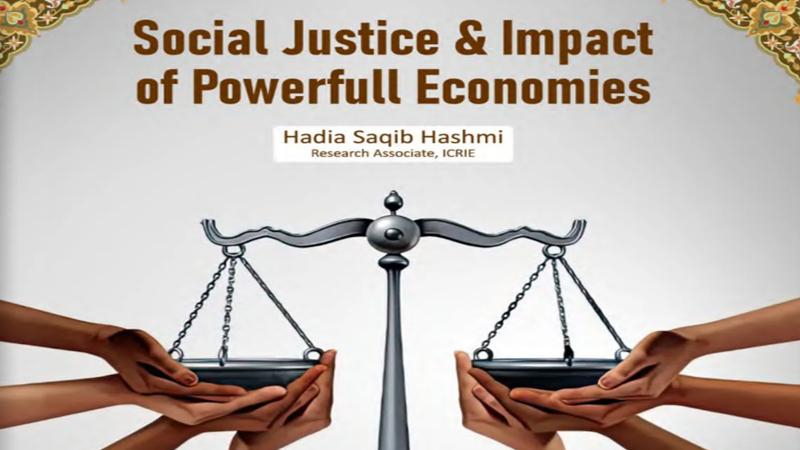Introduction
Social justice is a multifaceted concept that encompasses the fair distribution of resources, opportunities, and privileges within a society. In an increasingly interconnected and open world, the pursuit of social justice becomes both more complex and more urgent. Globalization, technological advancements, and increased awareness of social inequalities have highlighted the need for a comprehensive approach to achieving social justice. This essay explores the dimensions of social justice in an open world, examining the challenges and opportunities presented by globalization, the role of technology, and the imperative of policy reforms. Additionally, it explores how powerful economies can undermine social justice, with a specific focus on the case of Palestine.
Globalization and Social Justice
Economic Inequality
Globalization has often led to increased economic disparities both within and between countries. The benefits of economic growth have not been evenly distributed, with wealth concentrated in the hands of a few while many remain in poverty. For instance, the World Inequality Report (2022) indicates that the richest 1% of the global population owns more than 45% of global wealth, highlighting the deep economic inequalities exacerbated by globalization (Chancel et al., 2022).
Labor Exploitation
The demand for cheap labor in a globalized economy has often led to exploitative working conditions, particularly in developing countries. Workers in these regions are frequently subjected to low wages, poor working conditions, and a lack of labor rights. Research shows that industries such as textiles and electronics often rely on labor from countries with lax labor regulations, leading to systemic exploitation (Smith & Johns, 2018).
Cultural Homogenization
Globalization has also led to the erosion of cultural identities and traditions, as dominant cultures overshadow local ones. This cultural homogenization undermines the social fabric of communities and can lead to social tensions and conflicts. Studies highlight how indigenous cultures and languages are at risk of extinction due to the pervasive influence of global cultural norms (Gibson & Dunbar, 2019)
The Role of Technology
Digital Divide
Access to technology and the internet is unevenly distributed, leading to a digital divide that mirrors and exacerbates other social inequalities. Those without access to digital tools and skills are at a significant disadvantage in terms of education, employment, and social participation. A study by the International Telecommunication Union (ITU) found that nearly half of the world's population remains offline, with significant disparities between urban and rural areas (ITU, 2021).
Surveillance and Privacy
Technological advancements have also raised concerns about surveillance and the erosion of privacy. Governments and corporations can use technology to monitor and control populations, often disproportionately targeting marginalized groups. Research indicates that
surveillance technologies are frequently deployed in ways that reinforce social and racial biases (Lyon, 2018)
Empowerment through Technology
On the positive side, technology can be a powerful tool for social justice. It can facilitate access to information, enable social mobilization, and support education and skill development. Initiatives such as online education platforms and digital activism have shown promise in empowering marginalized communities and promoting social change (Bonilla & Rosa, 2015).
Policy Reforms for Social Justice Economic Policies
Policies that promote inclusive economic growth are essential. This includes progressive taxation, social safety nets, and measures to ensure fair wages and working conditions. Research highlights the effectiveness of redistributive policies in reducing economic inequality and promoting social justice (Piketty, 2014).
Education and Health
Access to quality education and healthcare is fundamental to social justice. Policies should focus on providing universal access to these services, particularly for marginalized groups. Studies show that investment in education and healthcare significantly improves social outcomes and reduces inequality (Sen, 1999).
Legal and Institutional Reforms
Strengthening legal and institutional frameworks to protect human rights and promote social justice is crucial. This includes ensuring access to justice, protecting labor rights, and addressing discrimination and bias in legal systems. Research underscores the importance of robust legal frameworks in promoting social justice and protecting vulnerable populations (Rawls, 1971).
Islamic Worldview and Social Justice in an Open World
The Islamic worldview emphasizes social justice as a fundamental principle, deeply rooted in the teachings of the Quran and the Hadith (sayings of the Prophet Muhammad). Islam advocates for the equitable distribution of wealth, the protection of human rights, and the provision of social welfare to ensure the well-being of all individuals in society. Zakat (charitable giving) and Sadaqah (voluntary charity) are central tenets that promote economic justice and support for the underprivileged. In an open world, the Islamic perspective on social justice underscores the importance of compassion, mutual aid, and community solidarity across borders. This worldview encourages Muslims to engage in social activism, support humanitarian efforts, and work towards the eradication of poverty and injustice globally. By fostering a sense of global brotherhood and emphasizing ethical conduct in all aspects of life, the Islamic approach to social justice aligns closely with the broader goals of creating a fair and equitable world.
Powerful Economies and Social Justice: The Case of Palestine
Economic Disparities
The economic disparities between Israel and Palestine are stark, with Israel having a much stronger and more developed economy. This economic imbalance has profound effects on the social and economic conditions in Palestine. Studies show that the economic blockade and restrictions on movement imposed by Israel have severely hindered Palestinian economic development, leading to high levels of unemployment and poverty (Roy, 2016).
Resource Allocation
The control over resources such as water and land is a critical issue in the Israeli-Palestinian conflict. Powerful economies and political alliances have supported policies that disproportionately favor Israel, leading to significant resource deprivation for Palestinians. Research highlights the
inequitable distribution of water resources, with Israel controlling a majority of the water supply, leaving Palestinians with limited access (Selby, 2013).
Political Influence
The political influence of powerful economies, particularly the United States, has played a significant role in shaping the dynamics of the Israeli-Palestinian conflict. The U.S. has consistently provided substantial economic and military aid to Israel, reinforcing its position in the region. This support has often been criticized for undermining efforts towards a fair and just resolution to the conflict. Analyses suggest that U.S. foreign policy in the Middle East has prioritized strategic alliances over social justice considerations (Mearsheimer & Walt, 2007).
Human Rights Violations
The ongoing conflict has led to numerous human rights violations, disproportionately affecting Palestinians. The use of military force, restrictions on movement, and other oppressive measures have resulted in significant suffering and deprivation for the Palestinian population. Reports from human rights organizations detail the impact of these actions on the daily lives of Palestinians, including restricted access to healthcare, education, and employment (B'Tselem, 2020).
Conclusion
Social justice in an open world is a complex and multifaceted challenge. Globalization and technological advancements present both opportunities and challenges in the pursuit of a more just society. Addressing economic inequality, ensuring equitable access to technology, and implementing comprehensive policy reforms are essential steps towards achieving social justice.
Additionally, the actions of powerful economies can undermine social justice, as seen in the case of Palestine, where economic disparities,
resource allocation, political influence, and human rights violations highlight the significant barriers to achieving a fair and just society. As we navigate an increasingly interconnected world, it is imperative to adopt a holistic approach that considers the diverse dimensions of social justice and strives to create a fair and equitable global society.
References
Chancel, L., Piketty, T., Saez, E., & Zucman, G. (2022). World Inequality Report 2022.
Smith, N., & Johns, M. (2018). Global Labor Conditions in the Textile and Electronics Industries.
Gibson, C., & Dunbar, T. (2019). Cultural Homogenization and Globalization.
International Telecommunication Union (ITU). (2021). The Digital Divide: Global Disparities in Access to Technology.
Lyon, D. (2018). Surveillance Society: Implications for Privacy and Social Justice.
Bonilla, Y., & Rosa, J. (2015). Digital Activism and Social Justice Movements.
Piketty, T. (2014). Capital in the Twenty-First Century.
Sen, A. (1999). Development as Freedom.
Rawls, J. (1971). A Theory of Justice.
Roy, S. (2016). The Gaza Strip: Economic Strangulation.
Selby, J. (2013). The Israeli-Palestinian Water Conflict.
Amnesty International. (2021). Military Operations in Palestine.
B'Tselem. (2020). Human Rights in Palestine.
Thabet, A., & Vostanis, P. (2017). The Mental Health of Palestinian Children.


